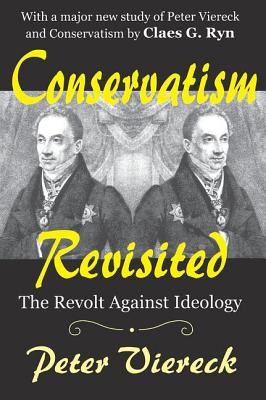
- We will send in 10–14 business days.
- Author: Peter Viereck
- Publisher: Routledge
- Year: 2004
- ISBN-10: 0765805766
- ISBN-13: 9780765805768
- Format: 15.9 x 22.8 x 1.5 cm, softcover
- Language: English
- SAVE -10% with code: EXTRA
Reviews
Description
Peter Viereck, poet and historian, is one of the principle theoreticians of conservatism in modern American political thought. In this classic work, Viereck undertakes a penetrating and unorthodox analysis of that quintessential conservative, Prince Metternich, and offers evidence that cultural and political conservatism may perhaps be best adapted to sustain a free and reasonable society.
According to Viereck's definition, conservatism is not the enemy of economic reform or social progress, nor is it the oppressive instrument of the privileged few. Although conservatism has been attacked from the left and often discredited by exploitation from the right, it remains the historic name for a point of view vital to contemporary society and culture. Divided into three parts, the book opens with a survey of conservatism in its cultural context of classicism and humanism. Rejecting the blind alley of reaction, Viereck calls for a discriminating set of principles that include preservation through reform, self-expression through self-restraint, a fruitful nostalgia for the permanent beneath the flux, and a preference for historical continuity over violent rupture.
Viereck locates our idea of Western political unity in Metternich's Concert of Europe whose goal was a cosmopolitan Europe united in peace. This ideal was opposed by both the violent nationalism that resulted in Nazism and the socialist internationalism that became a tool of Soviet Russian expansionism. While not ignoring the extremely negative aspects of Metternich's legacy, Viereck focuses on his attempts to tame the bellicosity of European nationalism and his little-known efforts to reform and modernize the Hapsburg Empire.
EXTRA 10 % discount with code: EXTRA
The promotion ends in 20d.19:53:57
The discount code is valid when purchasing from 10 €. Discounts do not stack.
- Author: Peter Viereck
- Publisher: Routledge
- Year: 2004
- ISBN-10: 0765805766
- ISBN-13: 9780765805768
- Format: 15.9 x 22.8 x 1.5 cm, softcover
- Language: English English
Peter Viereck, poet and historian, is one of the principle theoreticians of conservatism in modern American political thought. In this classic work, Viereck undertakes a penetrating and unorthodox analysis of that quintessential conservative, Prince Metternich, and offers evidence that cultural and political conservatism may perhaps be best adapted to sustain a free and reasonable society.
According to Viereck's definition, conservatism is not the enemy of economic reform or social progress, nor is it the oppressive instrument of the privileged few. Although conservatism has been attacked from the left and often discredited by exploitation from the right, it remains the historic name for a point of view vital to contemporary society and culture. Divided into three parts, the book opens with a survey of conservatism in its cultural context of classicism and humanism. Rejecting the blind alley of reaction, Viereck calls for a discriminating set of principles that include preservation through reform, self-expression through self-restraint, a fruitful nostalgia for the permanent beneath the flux, and a preference for historical continuity over violent rupture.
Viereck locates our idea of Western political unity in Metternich's Concert of Europe whose goal was a cosmopolitan Europe united in peace. This ideal was opposed by both the violent nationalism that resulted in Nazism and the socialist internationalism that became a tool of Soviet Russian expansionism. While not ignoring the extremely negative aspects of Metternich's legacy, Viereck focuses on his attempts to tame the bellicosity of European nationalism and his little-known efforts to reform and modernize the Hapsburg Empire.


Reviews